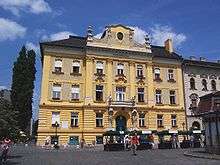Óbuda


Óbuda was a city in Hungary that was merged with Buda and Pest on 1 January 1873; it now forms part of District III-Óbuda-Békásmegyer of Budapest. The name means Old Buda in Hungarian (in German, Alt-Ofen). The name in Croatian and Serbian for this city is Stari Budim, but the local Croat minority calls it Obuda (the name "Budim" they use for the fortress in Buda).
The island (Óbuda Island) next to this part of the city today hosts the Sziget Festival, a huge music and cultural festival.
Óbuda's centre is Fő tér (Main Square), connected to a small square with a sculpture of people waiting for the rain to stop. It is accessible by HÉV (Árpád híd station).
History
Settlements dating from the stone age have been found in Óbuda. The Romans built Aquincum, the capital of Pannonia province here. Hungarians arrived after 900 and it served as an important settlement of major tribal leaders, later kings. Béla IV of Hungary built a new capital after the 1241-1242 Mongol invasion in Buda, somewhat south of Óbuda.
The Jewish Elementary School in Óbuda was victim of the Holocaust. On 13 June 2012, a commemorative plaque to the former teachers and students was affixed to the wall of the building erected on the site of the school (Budapest, District III, Óbuda Street Nr 6).
- Quote: I will give them an everlasting name, that shall not be cut off. (Isaiah 56:5)
People
- Károly Bebo (1712 - 1779) - sculptor
- Egon Orowan (1902–1989) - physicist and metallurgist
- József Manes Österreicher (1759-1831) - physician
Museums
- Aquincum Museum - The small museum displays jewels, glassware, metal tools, and wall paintings relating to the lives of ancient Romans living in Aquincum. The museum's outdoor site contains remnants of the town, including courtyards, baths, a market place, shrines, large columns, sculptures, and a stone sarcophagus. Roman ruins elsewhere in Óbuda include baths that served the Roman legionnaires stationed in Acquincum, the Hercules Villa, and two amphitheatres, the Aquincum Civil Amphitheater and the larger Aquincum Military Amphitheatre.
- Kassák Museum (a branch museum of the Petőfi Literary Museum) - Features items relating to the life and work of the Hungarian avant garde writer Lajos Kassák (1887-1967).
- Obudai Museum - The primary collection features local history. The museum also encompasses Hungary’s only toy museum, and the Zsigmond Kun Flat Museum, which features folk furniture.
- Museum of Hungarian Trade and Tourism
- Vasarely Museum, Zichy Palace - Features work by the Hungarian-born painter Vasarely, as well as temporary exhibitions of other Hungarian artists.
Sport
- III. Kerületi TUE, football team
- 33 FC, football team
External links
| Wikimedia Commons has media related to Óbuda. |
| Wikivoyage has a travel guide for Óbuda. |
- Official website (Hungarian)
- A Walk through Old Buda (English)
Coordinates: 47°33′N 19°02′E / 47.550°N 19.033°E